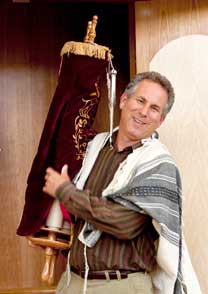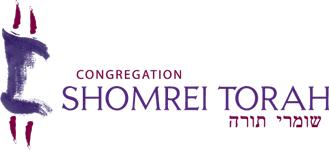A Greater Purpose
April 24, 2005 | Katy Hillenmeyer | Santa Rosa Press Democrat
Years before trading his job in sales for the seminary, Rabbi George Gittleman learned about forging unlikely alliances on the soccer field.
 One of 100 students at an Episcopalian high school in Louisville, Ky., Gittleman played on a team that could compete against larger schools in a boys’ league only by rounding out its roster with girls.
One of 100 students at an Episcopalian high school in Louisville, Ky., Gittleman played on a team that could compete against larger schools in a boys’ league only by rounding out its roster with girls.
“The only way we were able to survive and even thrive was we really cared for each other,” recalled Gittleman, 42, a former team captain and all-state athlete.
“We won games because we stood together.”
The spiritual leader of Sonoma County’s largest synagogue, Gittleman likens his congregation’s move out of shared quarters with a Methodist church into a $6 million synagogue to challenges his soccer team faced.
“At Congregation Shomrei Torah, we’re a band of hard-working, hardy-hearted folk,” the Santa Rosa rabbi said. “But the task is great: Owning a home is hard enough in Sonoma County, let alone trying to build a synagogue.”
The Gittlemans and Shomrei Torah’s 375 families — including many who will gather tonight for a Passover Seder — are taking out second mortgages, dipping into retirement reserves and deferring college savings to fund their new sanctuary in the Bennett Valley hills.
Meanwhile, Gittleman continues the outreach that has seen his congregation flower from 150 families when he took the pulpit in 1996 — fostering friendships with unaffiliated and conservative Jews, Muslims, Christians, and social activists whose concern for the homeless, hungry and the environment he shares.
“If you’ve met him for any length of time, you’re drawn to him as a friend,” said the Rev. Dale Flowers, whose First Presbyterian Church hosted an interfaith panel including Gittleman this month. “It’s not about him building his own little kingdom: He’s much more interested in serving the greater purpose.”
Seeds of faith-sharing
That interfaith spirit is kindled daily at the Yulupa Avenue home that Christ Church United Methodist has shared with Congregation Shomrei Torah for 31 years.
Together, the two congregations are building a food pantry to help combat hunger, the latest step in their shared mission of social action.
Gittleman is affectionately known as the “rabbi of the church,” a blending of religious cultures that echoes his upbringing at Louisville’s St. Francis School.
Born in Chicago, Gittleman moved to Kentucky as a toddler after his mother divorced and then married David Gittleman, son of a conservative rabbi.
“I don’t think you can grow up Jewish in the South without having some ecumenical tendencies — without necessarily becoming tolerant of diversity, particularly on religious grounds,” said Gittleman’s college mentor, historian Marshall True.
Gittleman fondly remembers Rabbi J.J. Gittleman, the grandfather who died when he was 6. But growing up a rabbi’s son “had been oppressive” to George’s adoptive father, and the elder rabbi’s death hastened the family’s flight from regular religious observance.
Later drawn to the University of Vermont by the mountains, skiing, soccer and the liberal arts, Gittleman took a junior-year semester break to study in Tel Aviv.
“It wasn’t a religious experience,” Gittleman said, “but it really woke me up to the fact that I was Jewish and I cared about it.”
True, a retired Vermont professor, recalled Gittleman’s early uncertainty about his life’s calling.
“He didn’t know what he was going to be, but he knew who he was,” True said. “There was some central core of identity in George that was rare for an 18-year-old kid.”
That composure would later help secure his first rabbinical post at Shomrei Torah. But by college graduation, ministry was not yet a blip on Gittleman’s radar.
A former horseman and woodcutter accustomed to physical labor, Gittleman initially returned to Louisville as an arborist. When back trouble forced him out of the trees, he headed cross-country in a rusted-out Subaru wagon to live in San Francisco, where he made weekend rock climbing with friends at Yosemite and Lake Tahoe his religion.
Grounded in 1986 by a near-fatal rock-climbing fall, Gittleman sought community elsewhere — and became increasingly involved with a conservative San Francisco synagogue.
Though not enamored of all aspects of temple life, “overall it spoke to me,” Gittleman remembered. “It filled a need I didn’t even know that much about.”
Unversed in Hebrew and daunted by a five-year seminary commitment, Gittleman got the push toward rabbinical studies he needed after meeting his future wife, Laura Collins, at a party about 15 years ago.
Well-read, bright and beautiful, “with a quiet kind of strength,” Collins hooked Gittleman immediately, he said, though at the time she wasn’t Jewish.
Collins converted to Judaism in Jerusalem, where Gittleman spent his first year in rabbinical school, and the couple married in Bolinas in 1992. Ordained in 1996, he sought a head rabbi’s role and a place to revel in nature and recreation, and Shomrei Torah’s members found their first full-time rabbi.
Into the synagogue
The father of infant twins, Gittleman inherited the Reform synagogue’s helm from Michael Robinson, a seasoned rabbi who had guided the once-faltering congregation. Membership waned after a 1984 fire gutted the sanctuary that Shomrei Torah leased. But Robinson — jailed in the South for protesting racial segregation in the 1960s and an organizer of Santa Rosa sleep-ins for the homeless during the 1990s — rebuilt membership from a core of 40 families.
The synagogue’s name tag button board, a custom borrowed from the Methodist church, reflects the array Shomrei Torah has embraced. Lined up alphabetically inside the doors, the buttons belong to intermarried spouses, gays and lesbians, retirees, converts, returning Jews and young students of the religious school the congregation opened in 1998.
“There’s such a wide spectrum of Jewish belief and behavior, and George can address that whole spectrum,” said congregation President Melissa Kort, citing both his reverence for tradition and his willingness to break from it.
Following the 1999 Sacramento synagogue bombings, Gittleman and Gayle Pickrell, pastor of Christ Church United, helped organize a local hate-free initiative. He has defended same-sex marriage; fought for affordable housing for seniors, farmworkers and people with disabilities; prayed at the local mosque; and initiated interfaith dialogue about touchy issues.
“People are entrenched in what they believe and don’t always want to see the other side,” said Said Mansour, president of the Islamic Society of Santa Rosa. “He approaches us with an open mind.”
When delegates at last summer’s national meeting of the Presbyterian Church U.S.A. began mulling divestment in companies doing business in Israel, Gittleman called on Presbyterian friends to help him raise awareness of Jews’ perspective on divestment — and on a West Bank security barrier that the Presbyterian assembly also condemned.
Jews and some Presbyterians have denounced the resolutions as one-sided, and Gittleman found many local Presbyterians receptive to his concerns.
“Interfaith conversations can get very fuzzy,” said Roger Hull, a retired Presbyterian minister from Windsor and frequent fly-fishing companion of Gittleman’s. “George brings to them a real sense of clarity and understanding.”
Three years ago, Shomrei Torah began including non-Jewish victims of genocide — including Cambodians, American Indians and Armenians — in its annual Holocaust memorial service.
“This was George’s brainchild,” recalled Dianne Smith, past president at Shomrei Torah. “… And he took some flack for it within the Jewish community.”
The rabbi once displayed a rainbow bumper sticker on his car to show solidarity with gays and lesbians, but peeled it off after periodic harassment escalated into a knife threat. Last weekend, a vandal painted swastikas on the sign marking Shomrei Torah’s new synagogue site.
“He’s been rebuffed,” said Stephen Harper, chairman of Shomrei Torah’s social action committee. “It’s given him more resolve that he needs to repair this broken community.”
Time of trial
During the first half of his Santa Rosa tenure, Gittleman maintained a burnout pace, working 80 hours a week.
Thanks to longtime child care provider Mary Ann Carvalho and an “army” of baby sitters, the Gittlemans managed the growing demands of George’s ministry and Laura’s nursing career. But the death of his brother Willie from cancer short-circuited that treadmill in 2001.
“In mourning, I couldn’t cope with the life I’d created for myself,” Gittleman recalled. “After my brother died, I tried to adjust to a more sane schedule.”
Revealing such vulnerabilities in his ministry, Gittleman has become more sought after in times of trial.
“At times he’ll even get emotional about somebody’s troubles,” said Mendel Wolvovsky, a Chabad rabbi who studies Hasidic philosophy with Gittleman. “His primary focus is really caring for the entire community.”
The widely broadcast terrorist attacks of 9/11 marked a rare and short-lived disconnect between a distressed congregation and Gittleman, whose family shuns television.
“At first I really missed the gravity of the experience, because I wasn’t watching the Twin Towers fall over and over again,” Gittleman recalled. “But sometimes there’s a benefit to having the spiritual leader removed slightly from common culture.”
A lover of books admired for his spirituality, Gittleman nevertheless defies the pastor-on-a-pedestal mold.
When Gittleman teleconferences each Monday with rabbis in Israel through a Shalom Hartman Institute fellowship, his dog, Sarah, often accompanies him in his office.
He decompresses with hot-tub soaks with neighbors, or a pinch of whiskey or dark chocolate.
His 9-year-old twins, Sophie and Levi, are busy with horseback riding, piano lessons, soccer and baseball — a juggling act complicated by the Gittlemans’ sabbath observance from sundown Friday to sundown Saturday.
“To be Jewish is to swim upstream in terms of the times and seasons of the year,” Gittleman acknowledged. “We’re always trying to strike a balance between the non-Jewish world and a religious life of integrity.”
As Jews prepared to celebrate the Passover this weekend, Gittleman challenged his congregation not only to rid their homes of traces of leavened bread, but to cleanse their lives of meaningless, “puffed-up stuff without any substance.”
“If you want to get out of your Egypt, you have to tell the truth,” he said, recalling Jewish ancestors’ exodus from Egypt and the biblical parting of the Red Sea.
“The vain, the empty in our lives is quite alluring,” Gittleman cautioned. “It turns out that being free is demanding work.”
